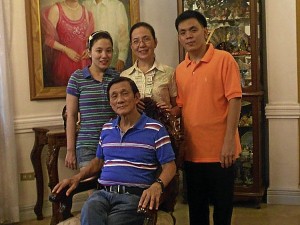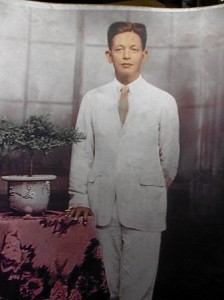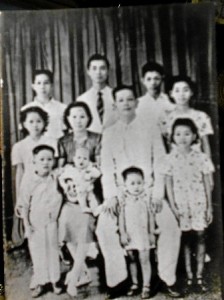For one man, trade comes 2nd to being Filipino
DAVAO CITY—Businessman Sebastian Angliongto recalls growing up in a traditional Chinese household where only slightly being late or absent for dinner could mean missing a meal for the night.
“My father was a very strict and disciplined man,” says Angliongto, chair emeritus of the Davao City Chamber of Commerce and Industry (DCCCII) and one of the few Mindanao leaders who served the government during the time of former President Ramos.
“He was very generous to others, but to us and to himself, he was very strict,” he recalls.
He remembers an incident when he was 8-years-old and his father’s friend, Alfonso Guino-o, asked him to accompany him to the pier. He went along, confident that he was doing his father’s friend a favor. But when he arrived home at half past noon, lunch had already been served. He was then told to go straight to his room.
“It was his way of imposing discipline,” Angliongto said. “Once he sat at the table, everyone was expected to be there. No one was supposed to get any special treatment. He used to say, ‘lead a life of your own, but don’t forget to respect your elders.’”
Article continues after this advertisementLearning this kind of discipline from his father was good for him, he said, but it would be hard to impose similar rules on his children.
Article continues after this advertisement“You would be deluged by ‘whys,’ that you will have to explain; and then, after you have explained, there would be a lot of comparing with other people,” Angliongto says.
“Time has changed. In our time, we were taught to follow even if we did not like it.”
Fondly called Angie by his friends and business associates, Angliongto gets teased—his friends call him kuripot, the Filipino word for stingy—because he continues to use his old cellular phone, instead of buying a brand new deice.
“Why would I buy a Blackberry when I only use my phone for texting? Why would I buy an expensive car when my old Revo is serving me well?” he says.
“My father was a hardworking and very thrifty man, and all my life, I tried to follow his ways.”
His father, Alfonso Angliongto, pioneered shipping in the Davao coastal towns in 1925. The business later expanded all the way down to the east coast towns of Cateel and Baganga in Davao Oriental and of Malita, Kiamba, Dadiangas to Cotabato in the south.
Angliongto said his father’s father belonged to the second wave of Chinese migrants who entered the Philippines through the south. The first wave, or the earliest batch of Chinese immigrants, entered the Philippines through Cavite and Manila and were persecuted by the Spaniards.
Angliongto’s grandfather used the southern route of Sandakan, entering through Siasi in Jolo and established their first business in Zamboanga. It was there where his grandfather’s two sons, Angliongto’s father and uncle, put up a store.
When they reached Davao in 1921, Angliongto’s father Alfonso started out with a kariton (cart) selling newspapers with his uncle, who later went to Malita in Davao del Sur and married a Filipina. His father finally left his store in Zamboanga and came down to Davao to build a 20-ton wooden boat at the Santa Ana wharf.
Shipping was his father’s lifelong dream. The 20-tonner started plying the coastal towns of the Davao Gulf. In 1925, he built a second ship named after the Fukien city of Hok Chiu, where his father came from. In 1936, when his father became successful enough, he bought a 120-ton Spanish steamship and named it SS Sebastian, because it was where Angliongto was born.
“I was as old as Davao City,” Angliongto had a habit of telling friends. The family ship, however, was destroyed during the Japanese occupation.
Among his friends in Davao, Angliongto would engage them in Bisaya and Tagalog. But sometimes he would wonder what his father would think if he knew he had forgotten much of his Chinese heritage except for Fukien, the language spoken at his father’s hometown.
Anglionto says that even his Fukien already sounds Bisaya and sounds funny to the real Fukienese.
Although his elder brothers had sent him to study at the Chiang Kai shek University in Manila to allow him to get in touch with his Chinese roots, it was at the University of the Philippines later on, where he took his agriculture course, that he learned Tagalog and savored Filipino food.
He says it was his UP education that turned him into a real Filipino, almost forgetting his Chinese culture.
My father used to tell us, he says, that “this is your country, this is where you were born and Christianized … You inherited my name, I am Alfonso now but my name is Ang Liong To; my family name is yours, you are citizens of this country, but you are of Chinese blood, don’t forget your roots.”
But he says sadly, though, that he has almost forgotten the language. He may have visited China seven or eight times, but he does not have any plans of settling there.
“My heart is here, this is where I was brought up, and I came to consciousness in this culture,” he says.
Even at the height of Martial Law, when the country was plunged into darkness and despair, Angliongto says, he had no desire to migrate.
When, out of curiosity, people ask which side he is on with the recent spat between the Philippines and China, he becomes agitated.
“How can people ask that?” he says. “I’ve been living here all my life, I don’t even speak the language of China, I would be a citizen without a country.”
On father’s day, he still recalls what his father used to tell his children when he was still alive: “Look at yourself as a tree—your root is China, the trunk is your clan, and I am your branch. The leaves and fruits fall to the ground, you come and go, but the tree remains strong and sturdy.”


